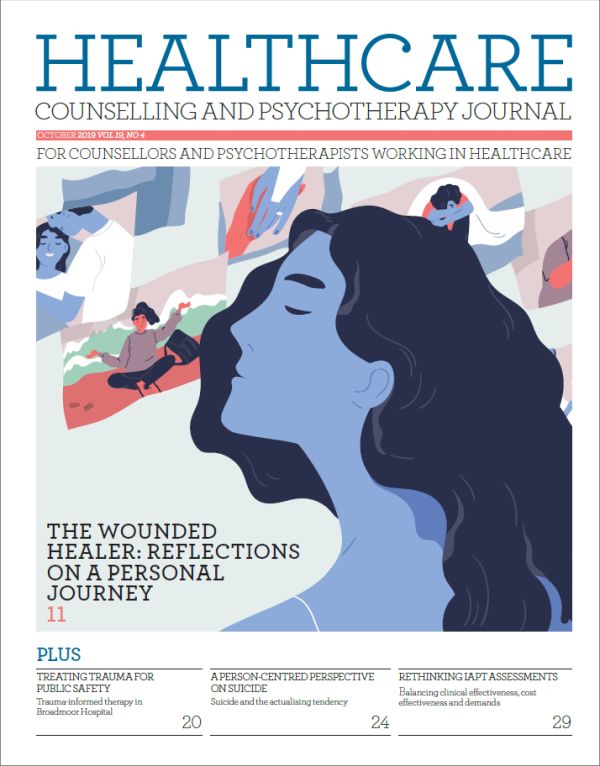In this issue
Features
The wounded healer: Reflections on a personal journey
Kay Mackay explores how her lived experience of mental illness impacts on her role as a counsellor
Treating trauma for public safety: the contribution of psychological support in a high security hospital (free article)
Estelle Moore describes Broadmoor Hospital’s trauma-informed service model
A person-centred perspective on suicide
Amanda McGarry explores whether suicide has the potential to be considered as an expression of the actualising tendency
Regulars
Chair’s report – BACP Healthcare
Satinder Panesar
Healthcare update
Judy Stafford
Policy briefing
Matthew Smith-Lilley
Profile
Gareth Bartlett
Therapy in primary care
Elaine Davies
Third sector perspective
Vicki Palmer

Divisional members and subscribers can download the pdf of this issue from the Healthcare Counselling and Psychotherapy Journal archive.
From the editor
Jung’s concept of the ‘wounded healer’ is one to which many of us can relate. It is often through our own experience of pain and suffering that we come to a place of being able to offer empathy and understanding to our clients. Through our work on ourselves, we gain an insight into what it might be like for our clients to sit across from us and explore their psychological wounds.
With this in mind, Kay Mackay reflects on how her lived experience of mental health difficulties impacts upon her work as a psychotherapeutic counsellor. She explores how personal experiences of mental health difficulties can help increase empathy through a shared understanding of psychological pain. It is clear that Kay’s own experiences allow her to meet her clients on a deeply human level.
This is a very personal, reflective piece that can encourage us all to think about how we can use reflexivity to enhance our practice with our clients. As Kay writes, ‘…it is through telling our personal stories that we draw meaning from suffering, process our experiences, share our vulnerabilities and connect with others.’ After all, this is what we ask our clients to do on a daily basis.
The importance of healing psychological wounds cannot be underestimated. Sometimes the consequences of untreated severe mental health difficulties can be tragic, resulting in harm to others and even death. In an insightful article, Estelle Moore describes the provision of psychological support to patients in Broadmoor Hospital. Broadmoor is a high security hospital, with around 200 male patients who have complex mental health needs. Most of them have been involved in violent offending, and have been referred to the hospital rather than a prison because it is more suited to their needs. The hospital provides trauma-informed support to the patients, exploring how their pasts have influenced and shaped their present. The role of the hospital is to help the patients to pick up the pieces after tragedy has occurred and reduce the risk of future harm. This important work provides an opportunity for healing for the individual and increased safety for the wider community.
No matter the quality of mental healthcare support we provide, there will still be those clients who feel so great a despair about their futures that they believe there is no way out other than to take their own lives. This can be a painful experience for any of us working as counsellors and psychotherapists, whatever our modality. In an innovative and thought-provoking article, Amanda McGarry explores the issue of suicide from a person-centred perspective. She studied a number of suicide notes in order to ascertain whether, in some cases, suicide could be considered as an expression of the actualising tendency – an individual’s innate drive to do their best and to grow. Amanda explores how this might prove a conundrum for the person-centred therapist, and particularly for those who work in organisations that have risk prevention policies that try to prevent suicide.
In the July issue of this journal, we included an interview with new BACP Healthcare Executive member, Angela Clarke. This time, it is the turn of her colleague, Gareth Bartlett, to introduce himself to members. Both these new Healthcare Executive members bring fresh skills and experience into the Executive, which will benefit members and help progress the work of the division. It is a time for both new beginnings and endings in the BACP Healthcare division.
Sadly, this is my final issue as Editor of the BACP Healthcare journal, as I am going to be focusing on further developing my private practice. I have learnt so much from my time in this role, and my respect and admiration for colleagues working in the healthcare setting has grown even greater, as I have understood more about the challenges that you face and the pressures of your working environment. I shall take much of what I have learnt into my private practice and hope that I can be a more reflexive practitioner as a result. I would like to thank you all for your support over the past few years, especially those of you who have contributed articles and columns to the publication. It is now time for someone new to take this journal forward and assist members in exchanging ideas and disseminating best practice. I would like to invite you to encourage them in this endeavour by continuing to send in articles about your work and providing suggestions for developing the journal so that it fully reflects your interests.
Joanna Benfield, Editor
hcpj.editorial@bacp.co.uk
